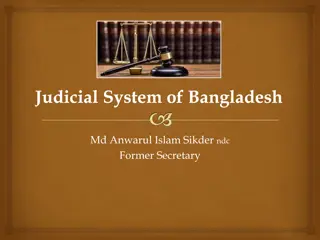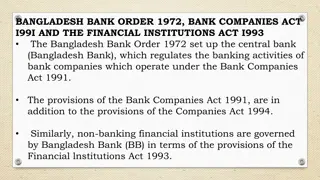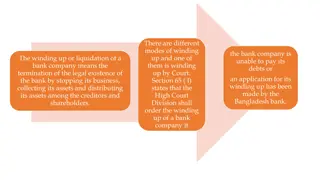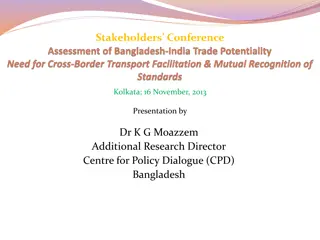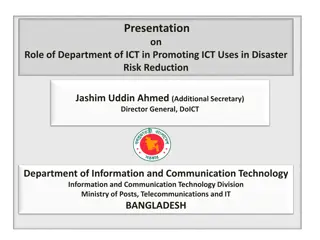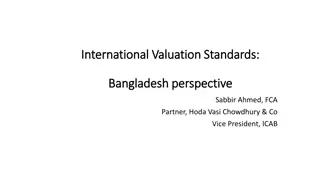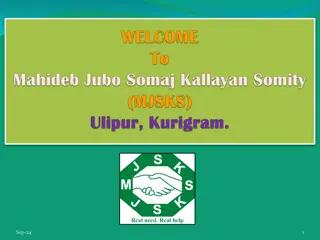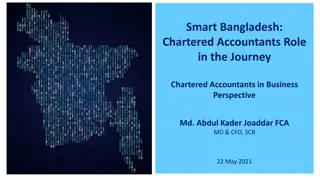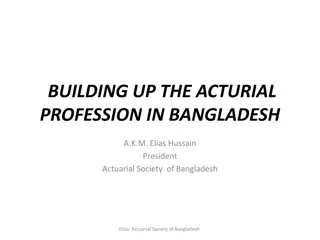
Court's Discretionary and Inherent Powers in Criminal and Civil Proceedings
Explore the discretionary and inherent powers of the court as outlined in the Code of Criminal Procedure, 1898, and the Code of Civil Procedure, 1908. Learn how these powers allow courts to prevent abuse of process, secure justice, and exercise discretion in criminal matters like bail and sentencing. Discover the High Court Division's inherent powers independent of any statutory authority, ensuring the ends of justice are met.
Download Presentation

Please find below an Image/Link to download the presentation.
The content on the website is provided AS IS for your information and personal use only. It may not be sold, licensed, or shared on other websites without obtaining consent from the author. If you encounter any issues during the download, it is possible that the publisher has removed the file from their server.
You are allowed to download the files provided on this website for personal or commercial use, subject to the condition that they are used lawfully. All files are the property of their respective owners.
The content on the website is provided AS IS for your information and personal use only. It may not be sold, licensed, or shared on other websites without obtaining consent from the author.
E N D
Presentation Transcript
Discretionary and Inherent Power of the Court
The Code of Criminal Procedure, 1898
The Code of Criminal Procedure, 1898 Saving of inherent power of High Court Division 561A. Nothing in this Code shall be deemed to limit or affect the inherent power of the High Court Division to make such orders as may be necessary to give effect to any order under this Code, or to prevent abuse of the process of any Court or otherwise to secure the ends of justice
In the case Smt. Bhagwanti vs. Kedarnath Kapur the Court held that, inherent powers of the High Court is inherent by its birth and have not been conferred by the Code. These powers are independent of and in addition to any other powers that the Court may exercise under the Code.
In the criminal adjudication, when in a Court proceeding any law is violated which causes abuse of the process of court or causes injustice, the High Court Division shall invoke its inherent power to prevent such abuse and secure ends of justice.
For criminal matters, the discretion applies at the time of granting bail or sentencing the offender. While sentencing, the law made a boundary of maximum and minimum punishment. But at the time of granting bail, even if it is a non-bailable offence, the judges exercise entire freedom.
Code of Civil Procedure, 1908
Code of Civil Procedure, 1908 Section 151: Saving of inherent powers of Court Nothing in this Code shall be deemed to limit or otherwise affect the inherent power of the Court to make such orders as may be necessary for the ends of justice or to prevent abuse of the process of the Court
The inherent power of the High Court Division is not exercised where express provisions of law are sufficient to give remedy. Similarly, the inherent power cannot be invoked in such a way that may amount to a conflict with express provisions of law.
Section 151 simply confirms Courts inherent power and this power cannot be exercised where alternative remedies, such as remedies by way of appeal, revision or review are available. Bangladesh Vs. Luxmi Bibi & Ors. 2 BLT (AD)-182
In civil cases, discretionary power is applied at the time of deciding interlocutory matters and also at the time of awarding cost. In the latter case, the court has to decide 'who will pay' and 'to what extent'.
The 'costs follow the event' rule is broadly being prescribed in the statutes in deciding who will pay but 'to what extent' is something that entirely rests upon the judge's decision, though the laws specify a ceiling of maximum costs. As the law has not any mandatory provisions of awarding cost, therefore, the picture of the uneven imposition of costs is very common even when the nature of the case is similar.
Unique Features and Applications of Inherent Powers of High Court Division:
1. The jurisdiction is completely discretionary. The High Court can refuse to use the power. 2. The jurisdiction is not limited to cases that are pending before the High Court. It can consider any case that comes to its notice (in appeal, revision or otherwise). 3. This power can be invoked only in an event when the aggrieved party is being unnecessarily harassed and has no other remedy open to it.
4. The High Court, under section 561A, does not conduct a trial or appreciate evidence. The exercise of this power (although it has a wide scope) is limited to cases that compel it to intervene for preventing a palpable abuse of a legal process. 5. The High Court has the power to provide relief to the accused even if s/he has not filed a petition under section 561A.
6. Inherent power u/s 561A can only be exercised by the High Court Division alone and not by Session judges or other subordinate Courts . The Indian Supreme Court held in Bindeswari Prasad Singh case that . . the subordinate Court had no inherent power and Section 561A conferred this power only to the High Court alone.
7. Only the High Court Division can quash a proceeding of the subordinate Courts by exercising its inherent jurisdiction where quashing is legally required u/s 561A of the Code of Criminal Procedure.
In the case Kapil Deo Sukla vs. The State Of Uttar Pradesh , the Court held that when the trial is prolonged for 20 years and the circumstances are such that the accused would not get a fair trial, the High Court Division can rightly quash the proceeding by using its inherent power.
Contract Act Section 69: Reimbursement of person paying money due by another in payment of which he is interested A person who is interested in the payment of money which another is bound by law to pay, and who therefore pays it, is entitled to be reimbursed by the other.
Specific Relief Act, 1877 The jurisdiction to specific performance under section 20 is discretionary and the court is not bound to grant such a relief merely because it is lawful to do so.
The Courts discretion is not arbitrary but sound and reasonable, guided by judicial principles and capable of correction, by a court of appeal.


